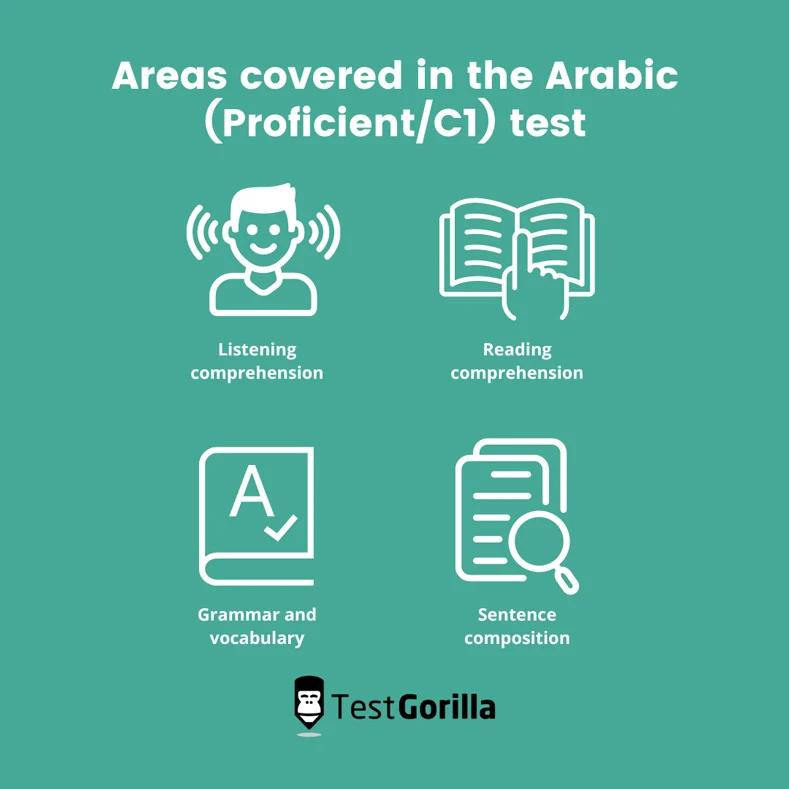Hiring multilingual employees brings much value to the table – from bridging gaps in international business partnerships to promoting workplace diversity.
As a recruiter, attracting candidates and engaging qualified applicants can be a struggle. It’s even more challenging to find candidates proficient in a particular language, like Arabic language experts.
This guide is for you if you’re looking to hire Arabic language experts for your organization.
You’ll learn about the steps to take when recruiting Arabic language experts and how to assess Arabic language proficiency more effectively with an Arabic test.
Table of contents
- 5 steps necessary for success in recruiting Arabic language experts
- 1. Conduct a job analysis and identify the level of Arabic language proficiency needed from candidates
- 2. Publish your job description
- 3. Screen candidates through skills assessments and an Arabic test
- 4. Conduct your interviews in Arabic
- 5. Decide and make a job offer
- Find and hire Arabic language experts quickly with TestGorilla’s Arabic tests
5 steps necessary for success in recruiting Arabic language experts
The growing demand for Arabic language experts can be attributed to various factors. These include a rapidly emerging consumer base in Arab countries, fast expansion of trade prospects in the Arab region, and an increasing number of global relocations among Arab native speakers. It’s not a surprise that the U.S. Census collected responses in Arabic and six other languages for the first time in 2020.
With Arabic as the sixth most spoken language in the world, all the more reason for your organization to start looking for Arabic language experts. We’ll also look at the benefits of having your candidates take an Arabic test before interviewing.
Here are the steps to getting started with Arabic language expert selection, plus tips and tools to help you quickly recruit suitable candidates.
1. Conduct a job analysis and identify the level of Arabic language proficiency needed from candidates
With a job analysis, you get into the nitty-gritty of the role’s duties and responsibilities, the knowledge and skills required to complete the job, and its relationship to other functions in your organization.
At this point, you also need to assess the level of Arab language fluency and the type of language skills (reading, writing, speaking, listening, or all four) that the job requires.
As a reference, you can use the Council of Europe’s Common European Framework of References for Languages (CFER). As an international standard, it recognizes language proficiency in six levels.
Let’s take a quick look at each level in terms of Arabic language expertise:
A1: Beginner
Arab language experts at this level can:
Understand and use basic phrases and everyday expressions of the Arabic language.
Introduce themselves and interact with other Arab speakers through simple topics as long as the other person is talking clearly and slowly.
A2: Elementary proficiency
Arab language experts at this level can:
Understand frequently used Arabic expressions covering intermediate topics such as local geography, employment, and family information.
Describe their immediate needs in Arabic.
Complete tasks that are routine and require a direct exchange of information.
B1: Intermediate or limited working proficiency
Arab language experts at this level can:
Understand intermediate topics in Arabic revolving around family, work, education, and leisure.
Describe their experiences, opinions, plans, events, and ambitions in Arabic.
Deal with situations during travel in areas that speak Arabic with ease.
B2: Upper intermediate or professional working proficiency
Arab language experts at this level can:
Grasp the main ideas of Arabic texts covering abstract and concrete concepts.
Spontaneously participate in slightly challenging Arabic conversations without strain on both parties. Occasional slip-ups may happen.
Come up with clear, detailed texts in Arabic and explain different viewpoints.
C1: Full professional proficiency
Arab language experts at this level can:
Understand complex topics and recognize implicit meanings in conversations with Arabic speakers.
Express themselves in Arabic with ease and without searching for expressions.
Create well-structured texts in Arabic using conjunctions and different types of organizational patterns.
C2: Bilingual or native speaker
Arab language experts at this level can:
Understand practically everything they hear or read in Arabic with ease.
Express themselves in Arabic fluently and accurately.
Make inferences accurately in conversations with Arabic speakers.
In summary, ask yourself the following questions to better understand the role:
What is the main function of the Arab language expert you’re looking to hire? A customer service representative for an Arab customer base may require a B2 level. Meanwhile, a staff member for the executive team who needs to write well-structured presentations in Arabic may need to be at a C1 level.
Will the role develop into another function that may require a higher level of proficiency in the future? You may need to hire Arabic language experts who are already fluent and proficient at C levels.
2. Publish your job description
Now that you have a clear idea of the role and the level of Arabic fluency you need from candidates, it’s time to publish your job description!
A good job description should:
For more tips on writing compelling job descriptions, go to our guide on how to write great job descriptions.
3. Screen candidates through skills assessments and an Arabic test
It’s tempting to interview candidates right away so you can gauge their Arabic language proficiency.
However, the interview process takes time for both you and the candidate. For this reason, it’s a good idea to test for language proficiency with an Arabic test before you start interviewing them.
Currently, TestGorilla offers the following Arabic tests:
Both Arabic tests are created by subject matter experts and cover the following areas:
Next, consider adding another set of pre-employment tests after one of the Arabic tests. Doing so ensures bias-free selection and helps you find the right candidate without spending too much time and money.
For example, you can also test for the following:
Soft skills
Role-specific tests
Cognitive ability tests
Culture add (much better than culture fit!)
Situational judgment tests
To learn more, go to our ultimate guide to pre-employment skills testing.
4. Conduct your interviews in Arabic
You’re almost done!
It’s time for you to invite the applicants for an interview who did well in your chosen Arabic test and pre-employment skills testing.
This final step can help you further evaluate a candidate’s fluency and expertise in Arabic, especially in speaking and listening. If they are not native speakers, you can also ask them to describe how they learned Arabic and if there are aspects of the language they struggle with.
If no one in your organization speaks or understands Arabic, consider hiring a freelance recruiter or contractor who is proficient and fluent in the language.
5. Decide and make a job offer
After your well-organized screening and testing, you’ve finally found the perfect Arabic language expert for your organization.
This last step is a critical one as you need to make sure that the candidate will accept your offer. You don’t want to lose a great candidate and start the selection process again.
Recommended reading: Improve your onboarding process with an onboarding checklist
Find and hire Arabic language experts quickly with TestGorilla’s Arabic tests
Having multilingual and multicultural members in your organization can bring different viewpoints and help build creative solutions to improve the sustainability of your business.
You don’t want to be one of the four employers who lost their business due to the lack of employees with foreign language skills.
And with the demand for bilingual Arabic-speaking professionals in the United States exceeding the supply, you need to be fast if you want to hire the best Arabic language experts, interpreters, and translators.
With TestGorilla, you don’t have to go to multiple testing platforms for an Arabic test and other essential skills you need to test for.
Browse the test library and quickly create an assessment with up to five separate tests. Candidates can even take it in one sitting. Plus, evaluating candidates’ scores is a breeze because TestGorilla allows you to rank candidates through a scoring benchmark.
Try TestGorilla for free and make your first assessment.
Related posts
Hire the best candidates with TestGorilla
Create pre-employment assessments in minutes to screen candidates, save time, and hire the best talent.
Latest posts
The best advice in pre-employment testing, in your inbox.
No spam. Unsubscribe at any time.

Hire the best. No bias. No stress.
Our screening tests identify the best candidates and make your hiring decisions faster, easier, and bias-free.
Free resources
This checklist covers key features you should look for when choosing a skills testing platform
This resource will help you develop an onboarding checklist for new hires.
How to assess your candidates' attention to detail.
Learn how to get human resources certified through HRCI or SHRM.
Learn how you can improve the level of talent at your company.
Learn how CapitalT reduced hiring bias with online skills assessments.
Learn how to make the resume process more efficient and more effective.
Improve your hiring strategy with these 7 critical recruitment metrics.
Learn how Sukhi decreased time spent reviewing resumes by 83%!
Hire more efficiently with these hacks that 99% of recruiters aren't using.
Make a business case for diversity and inclusion initiatives with this data.




















